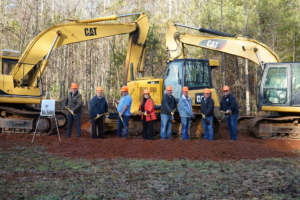
Biden Administration Awards NC Historic $1.09 Billion Grant for S-Line
President Biden and US Department of Transportation officials announced today that North Carolina will receive a $1.09 billion discretionary federal grant to design and build the first segment of the S-Line, a high-performance passenger rail line to better connect North Carolina and Virginia, and rural and urban communities in North Carolina.
“This is great news and underscores our successful efforts to build a transportation system that works for all North Carolinians,” Governor Roy Cooper said. “The S-Line is a critical project that will provide fast, frequent and reliable service connecting North Carolina, Virginia and the Northeast. It extends our already popular passenger rail service between Charlotte and Raleigh, and provides people, especially those in underserved areas, a safe, convenient and inexpensive way to get where they’re going.”
“We are grateful to our federal partners who recognize the importance of transportation to our quality of life and getting people better access to jobs, health care and educational opportunities,” said NC Department of Transportation Secretary Joey Hopkins. “We envision a future with modern, efficient and sustainable passenger rail providing reliable and comfortable travel between North Carolina and the Northeast.”
State officials and congressional offices were notified on Tuesday of the impending award, part of more than $8 billion being awarded throughout the country from the Bipartisan Infrastructure Law and announced today by President Biden in Las Vegas. The Federal Railroad Administration (FRA) grant awarded this week to the N.C. Department of Transportation will be used to complete the initial phase of the Raleigh to Richmond Innovating Rail Program, which includes construction on the S-Line rail corridor from Raleigh to Wake Forest. The $1.09 billion grant marks the largest grant the NCDOT has received to date.
The federal rail agency on Friday also awarded the NCDOT seven grants totaling $3.5 million as part of the Corridor Identification and Development program. These grants will help enhance the state’s existing passenger rail services between Charlotte and Raleigh and expand passenger rail into other areas of North Carolina and other states.
The S-Line rail corridor is a freight line, owned by CSX, that connects Richmond and Raleigh on the federally-designated Southeast Corridor. Virginia has already acquired the line in their state from CSX, and North Carolina officials are working to finish a deal to purchase the corridor in North Carolina. Once the Raleigh to Richmond program is complete, the passenger rail service will save over an hour of travel time between the two cities. The service will also allow much more frequent and reliable train service and make the trip to Washington D.C. competitive with driving times.
Prior to this week’s grant announcement, S-Line corridor-related projects had received about $110 million in discretionary federal funds to advance the project. Those funds paid for parts of the project including surveying, preliminary engineering and station development referred to as mobility hubs. The mobility hubs bring together the rail station with last-mile transportation solutions like transit and ridesharing services that make other modes of travel accessible so customers can get to their final destinations quickly and easily.
“What has made this project so successful is the partnership we have with the cities and towns along the S-Line,” said Julie White, NCDOT’s deputy secretary for Multimodal Transportation. “Bringing passenger rail back to the downtowns will further community efforts to grow vibrant main streets with mixed-use developments.”
Officials will use the $1.09 billion grant for final engineering design, right of way acquisition and construction costs for the section of the S-Line from Raleigh to Wake Forest. The money will also be used on new and upgraded track and replacement of at-grade crossings with highway/rail overpasses. Officials plan to upgrade the existing freight rail line to accommodate passenger rail service while maintaining the existing freight rail service. Construction in Wake County will also include highway and rail bridges, including two safety projects in Cary that are also on the Southeast Corridor.
The NCDOT will also receive from FRA $3.5 million in Corridor Identification and Development program grants, the Federal Railroad Administration announced Friday. Those seven grants will be used to begin the planning process for developing passenger services on rail corridors between:
- Charlotte and Atlanta
- Charlotte and Kings Mountain
- Charlotte and Washington D.C.
- Fayetteville and Raleigh
- Wilmington and Raleigh
- Winston-Salem and Raleigh
- Salisbury and Asheville
This week’s news comes as the NC By Train passenger rail service is experiencing record-breaking ridership. Helping drive the increased ridership are many new state services, including the expansion of the passenger rail service to five daily round trips between Charlotte and Raleigh this year.
“Offering more passenger rail services along the S-Line will bring even greater benefits to North Carolina for decades to come,” said Jason Orthner, director of NCDOT’s Rail Division. “Adding to our existing passenger rail service will save people more time and money, make travel more efficient and comfortable, and will help reduce congestion on our highways.”
Commissioners Break Ground for a Water Tank in Collettsville
The Caldwell County Board of Commissioners broke ground for a water tank that will be located on Rocky Road in the Collettsville community. “It has taken years of work and a lot of patience for us to reach this day. We started planning in 2017, and through a lot of starts, stops, as well as a pandemic, we’re finally here, breaking ground on a new water tank in Collettsville,” said Caldwell County Board of Commissioners Chairman Randy Church. The 200,000-gallon tank will provide water to more than 500 current customers and could serve an additional 1,000 customers. The tank will also improve water quality and increase water pressure for fighting fires. Steel for the tank is now in fabrication, and site works (has already begun) began on Monday. The $4.3 million project is funded in part by the American Rescue Plan Act and is expected to be completed by Spring 2025.
Officials gathered on Friday to break ground for a water tank in northern Caldwell County. Pictured (left to right) are Stephen Brown, PE, Senior Consultant with HDR; Tony Helton, Caldwell County Chief Financial Officer; Barry Calloway, Caldwell County Public Works Supervisor; Heather Cox, Caldwell County Deputy Director for Public Works; Robbie Wilkie, Caldwell County Commissioner, Michael Padilla, Project Manager with Phoenix Fabricator & Erectors; Donnie Potter, Caldwell County Commissioner; and Randy Church, Chairman of the Caldwell County Board of Commissioners.

State Wildlife Agency Reports Increase in Serious and Fatal Firearm-Related Hunting Incidents
The North Carolina Wildlife Resources Commission (NCWRC) Law Enforcement Division is experiencing an increase in firearm-related hunting incidents this year involving serious injury and fatalities. NCWRC reminds hunters to practice firearm safety when hunting or using firearms. Wildlife Law Enforcement reports there have been five fatalities involving hunting with a firearm so far this hunting season, more than the past three seasons combined, which had one fatality between 2020-2022. Fourteen hunting-related incidents have occurred thus far in 2023, with 11 of them involving a firearm.
“The current data for this season indicates that 50% of hunting incidents involving a firearm resulted in a fatality,” said Capt. Branden Jones of NCWRC’s Law Enforcement Division.
North Carolina ranks seventh in the nation for licensed hunters at 603,995, according to the International Hunter Education Association (IHEA). Many gunshot injuries occur when hunters fail to properly identify their target and mistake another hunter for game, or carelessly handle a firearm that results in self-inflicted injuries. Hunting incidents can be reduced by practicing safe firearm handling.

NCWRC offers the following important rules of firearm safety:
- Positively identify target before pulling the trigger.
- Always point a firearm in a safe direction.
- Treat every firearm as if it were loaded and never assume it’s unloaded.
- Use binoculars, rather than a rifle scope, to identify the target.
- Keep finger out of the trigger guard and off the trigger until ready to shoot.
- Be sure of the target and that there are no houses, vehicles, powerlines, livestock or people in front of or behind it.
- Avoid the use of alcohol and drugs as they may affect judgment. when hunting.
- Comply with blaze orange laws as required.
“Let someone know your whereabouts and approximate return time,” says Capt. Jones. “We want everyone participating in hunting activities to keep safety as their number one priority and continue to make memories for many years to come.” In efforts to reduce hunting-related incidents, NCWRC offers basic hunter education certification courses, both in-person and online. “Through increased education, access to shooting ranges, and advanced educational opportunities, students and hunters become more skilled and proficient in the use of hunting equipment,” said NCWRC Engagement and Education Manager, Carissa Daniels. “They also help hunters become more knowledgeable and aware of measures they can incorporate for a safer hunting experience.”

